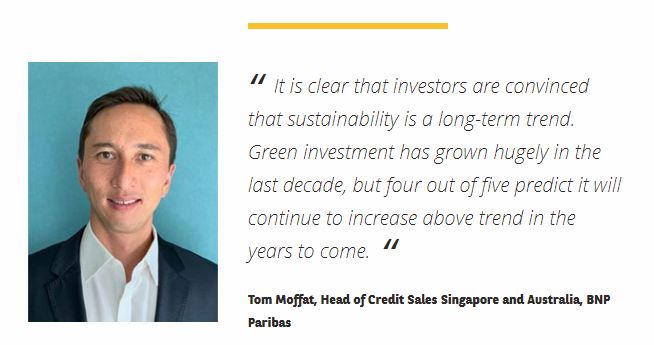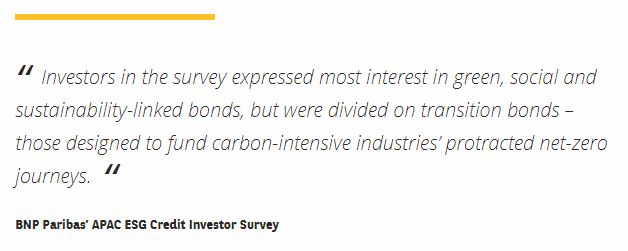Asian fixed income investors overwhelmingly see sustainable investing and ESG analysis as critical to their long-term success, according to BNP Paribas.
As economies continue to emerge from the Covid-19 pandemic and extreme weather events take their place in the headlines once again, BNP Paribas’ APAC ESG Credit Investor Survey confirmed that Asian investors are more than keeping pace with the global ESG trend. Some 95% of respondents said that ESG analysis has grown in importance over the past two years, and 94% described sustainability as a success factor for their investments.

“We’re in the middle of a fundamental structural shift in the way corporations and governments raise funding for their future development,” said Chaoni Huang, Head of Sustainable Capital Markets APAC at BNP Paribas. “The Asian investor base will be critical to the region’s transition to a more sustainable, long-term future.”
ESG funds are growing at a rapid clip in Asia. In the second quarter of this year, total assets invested in Asian ESG funds grew 3.3% to a record US$36.3 billion, according to Morningstar – mostly in equity-focused strategies.[1] The BNP Paribas APAC ESG Credit Investor Survey sought to analyse the fixed income landscape, asking where Asia Pacific currently sits on the ESG journey and whether the region harbours opinions that set it apart.
Sustainability is long-term
The great majority of Asia-based bond investors now recognise that ESG is a long-term success factor for their business: just 6% believe ESG is purely a marketing tool that has no impact on investment decisions. The remaining 94% are positive that sustainable investing is aligned with their long-term investment success: 52% say it achieves the same returns while also making a positive impact; 27% believe it reduces risk and enhances risk-adjusted returns; and 15% state that it enhances returns and helps achieve alpha.
A similar proportion believes that gaining insights into the sustainability aspects of their investments is more important now than it was two years ago. ESG analysis has increased in importance for 95% of respondents. Of those, 23% regard ESG analysis as essential for investment performance, while 48% recognise its importance in mitigating risk. Just under a quarter – 24% – are focusing more on ESG analysis to drive AUM growth and win more mandates.
“Although their reasons for taking ESG investing seriously may differ, it is clear that investors are convinced that sustainability is a long-term trend,” said Tom Moffat, Head of Credit Sales Singapore and Australia, BNP Paribas. “Not only do our respondents see it as key to future performance, but they also want to embed ESG analysis in their investment decisions.”

Investors working to establish systems to fully respond to the ESG trend have good reason to continue their efforts. Despite a near doubling of Green, Social & Sustainability (GSS) bond issuance in 2020,[2] the survey revealed that investors expect demand will continue to grow: 80% expect their ESG assets under management (AUM) to increase by more than 30% in the next two years, and 21% see it doubling or more over that time. Only 20% see the proportion of their AUM dedicated to ESG investments remaining the same over this period. “Green investment has grown hugely in the last decade,” said Moffat, “but four out of five predict it will continue to increase above trend in the years to come.”
Products and prices
Investors in the survey expressed most interest in green, social and sustainability-linked bonds, but were divided on transition bonds – those designed to fund carbon-intensive industries’ protracted net-zero journeys. “Transition bonds are likely to become more prevalent as hard-to-abate industries seek funding to start decarbonising,” said Huang. “But they are a relatively new asset class, and it’s understandable that just under half of our respondents felt they would need more information about them before committing funds to them.”

The survey also asked investors if they would pay extra for new labelled bonds – a ‘greenium’ over non-labelled instruments. Respondents were evenly split between those who would and those who would not. Among the 50% who would accept a lower spread, 7% said that the cost of ESG reporting justified it, and 21% felt ESG-compliant issuers have less downside risk. Furthermore, 22% felt the cost impact is a result of a limited supply of labelled bonds, implying that increasing demand will have a beneficial impact on spreads.
The 50% who were unwilling to accept a greenium argued that the default risks and economic value remain unchanged. “The relative pricing of sustainable assets remains a polarising concept among fixed income investors,” said Huang. “While investors increasingly see ESG factors as an important part of valuations, many are reluctant to give up any performance in this low interest-rate environment.”
Fixed income investors in Asia are aware of the radical changes that are gathering pace in their market – and this BNP Paribas survey highlights their opinions and concerns.
“Investors’ responses reveal a strong commitment to developing the skills and knowledge they need to adapt,” concluded Huang. “The fact that these investments will have a positive impact adds to the sense of urgency they express, and their engagement with putting effective structures in place suggests change will continue apace.”

